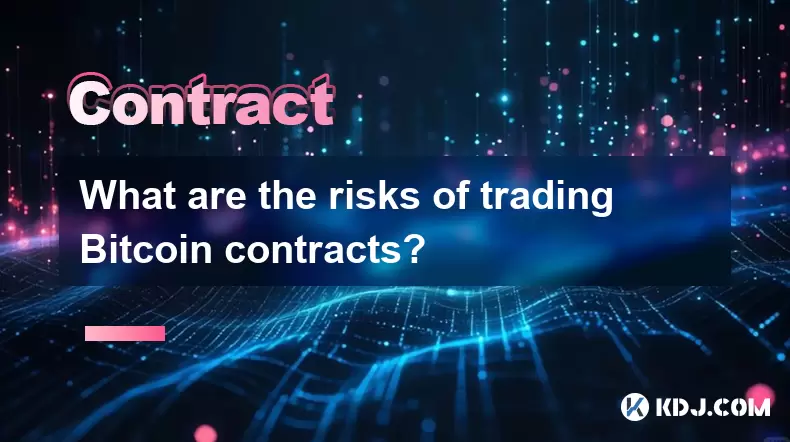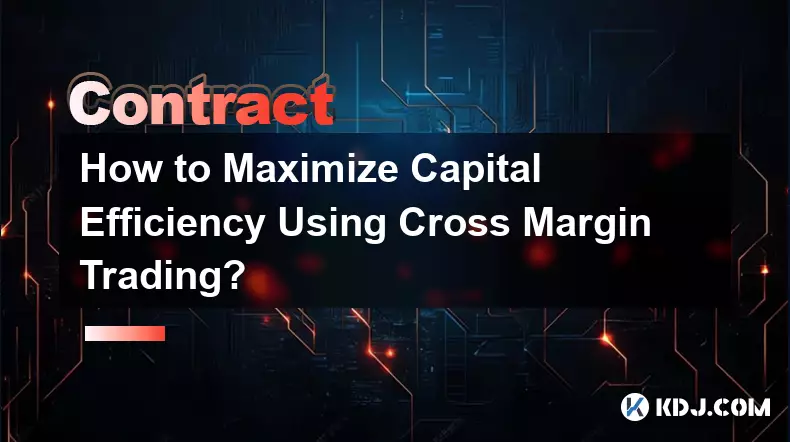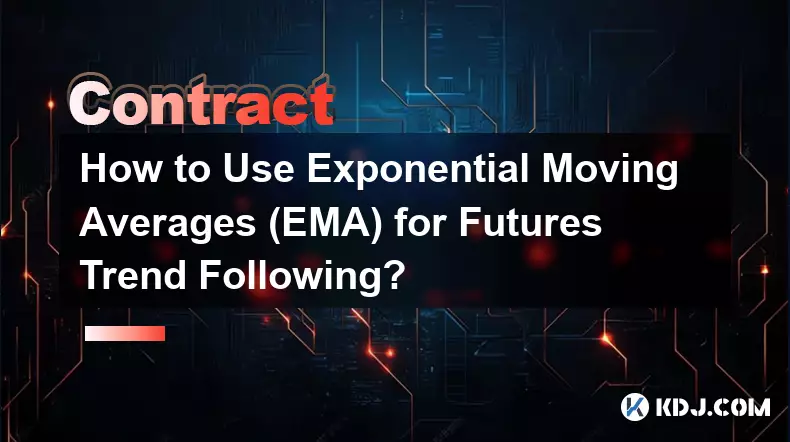-
 bitcoin
bitcoin $87959.907984 USD
1.34% -
 ethereum
ethereum $2920.497338 USD
3.04% -
 tether
tether $0.999775 USD
0.00% -
 xrp
xrp $2.237324 USD
8.12% -
 bnb
bnb $860.243768 USD
0.90% -
 solana
solana $138.089498 USD
5.43% -
 usd-coin
usd-coin $0.999807 USD
0.01% -
 tron
tron $0.272801 USD
-1.53% -
 dogecoin
dogecoin $0.150904 USD
2.96% -
 cardano
cardano $0.421635 USD
1.97% -
 hyperliquid
hyperliquid $32.152445 USD
2.23% -
 bitcoin-cash
bitcoin-cash $533.301069 USD
-1.94% -
 chainlink
chainlink $12.953417 USD
2.68% -
 unus-sed-leo
unus-sed-leo $9.535951 USD
0.73% -
 zcash
zcash $521.483386 USD
-2.87%
What are the risks of trading Bitcoin contracts?
Bitcoin contract trading carries significant risks due to extreme volatility, leverage, and potential liquidation, requiring careful risk management and awareness of market conditions.
Jul 19, 2025 at 03:49 am

Market Volatility and Price Fluctuations
Trading Bitcoin contracts involves exposure to extreme market volatility, which is one of the most significant risks. Bitcoin's price is known to experience sharp swings within short time frames due to factors such as regulatory news, macroeconomic trends, and market sentiment. When trading contracts, especially leveraged ones, even a minor price movement can lead to substantial losses or liquidation.
Contracts are derivative instruments that derive their value from the underlying asset—in this case, Bitcoin. Traders often use leverage to amplify potential profits, but this also magnifies the risk. A small adverse movement in the price of Bitcoin can trigger a margin call, forcing traders to deposit additional funds or risk having their positions forcibly closed.
Furthermore, volatility clustering is a phenomenon where high volatility tends to be followed by more volatility. This makes it challenging to predict and manage risk effectively. Traders must be aware of this and understand how to implement risk management strategies like stop-loss orders and position sizing.
Leverage and Margin Risks
Leverage is a double-edged sword in Bitcoin contract trading. While it allows traders to control a larger position with a relatively small amount of capital, it also increases the potential for significant losses. For instance, a 10x leveraged trade means that a 1% adverse move in Bitcoin's price could result in a 10% loss on the invested capital.
Margin requirements are crucial to understand when entering into a Bitcoin futures or perpetual contract. Traders must maintain a minimum margin level, and if the value of their account falls below this due to losses, the broker or exchange may liquidate the position automatically. This process is known as forced liquidation, and it can occur without prior notice.
Some platforms offer auto-deposit features to prevent liquidation, but these should not be relied upon as a long-term risk management strategy. Traders must actively monitor their account equity, liquidation price, and available margin at all times to avoid unexpected losses.
Counterparty and Exchange Risks
Bitcoin contract trading often takes place on centralized exchanges or through over-the-counter (OTC) agreements, both of which carry counterparty risk. In the event that the exchange or counterparty fails to honor its obligations—due to insolvency, fraud, or technical issues—traders may face loss of funds or inability to close positions.
Some exchanges have faced regulatory scrutiny, hacks, or operational failures, which can disrupt trading and result in unrecoverable losses. Therefore, it is essential to trade only on reputable platforms with strong security measures and transparent operations.
Additionally, withdrawal restrictions or trading halts during periods of extreme volatility can prevent traders from exiting positions at desired prices. This further highlights the importance of selecting platforms with proven track records and robust risk management frameworks.
Liquidity Challenges in Contract Markets
Liquidity plays a crucial role in the execution of Bitcoin contract trades. In highly liquid markets, traders can enter and exit positions quickly at stable prices. However, during periods of high volatility or low trading volume, liquidity can dry up, leading to slippage and unfavorable execution prices.
Certain types of contracts, such as perpetual futures, may have varying levels of liquidity depending on the exchange and the funding rate mechanism. If a trader attempts to close a large position in a thinly traded market, they may not find enough buyers or sellers, resulting in delayed exits and larger-than-expected losses.
Traders should also be aware of order book depth and bid-ask spreads. Wide spreads can increase the cost of entry and exit, especially for high-frequency or scalping strategies. Monitoring liquidity indicators and using limit orders can help mitigate these risks.
Regulatory and Legal Uncertainties
The regulatory landscape for cryptocurrency trading, including Bitcoin contracts, remains uncertain in many jurisdictions. Governments and financial regulators are continuously updating rules around digital assets, which can impact the legality and availability of contract trading.
In some regions, restrictions on leverage, trading bans, or tax implications may be imposed without prior notice. Traders must stay informed about the legal status of Bitcoin derivatives in their country and ensure compliance with local laws.
Moreover, enforcement actions against exchanges or traders can result in frozen accounts, funds seizure, or criminal charges in extreme cases. It is crucial to understand the jurisdictional risks and operate within the boundaries of the law to avoid legal complications.
Frequently Asked Questions
Q: Can I lose more than my initial investment when trading Bitcoin contracts?A: Yes, if you're using leverage, it is possible to lose more than your initial deposit. Leveraged positions can result in losses that exceed the margin used, especially if stop-loss orders are not in place or if the market moves sharply against the position.
Q: How can I check the liquidation price of my Bitcoin contract position?A: Most exchanges provide a liquidation price indicator in the trading interface. This shows the price at which your position will be automatically closed due to insufficient margin. You can also calculate it manually by considering your entry price, leverage, and margin used.
Q: Are Bitcoin futures contracts the same as perpetual contracts?A: No, Bitcoin futures contracts have a fixed expiration date, while perpetual contracts do not. Perpetual contracts are designed to mimic spot prices through funding rate mechanisms, allowing traders to hold positions indefinitely, subject to margin requirements.
Q: What is the funding rate in Bitcoin perpetual contracts?A: The funding rate is a periodic payment made to either long or short traders to ensure that the price of the perpetual contract stays close to the spot price of Bitcoin. It is usually settled every 8 hours and can be positive or negative, depending on market conditions.
Disclaimer:info@kdj.com
The information provided is not trading advice. kdj.com does not assume any responsibility for any investments made based on the information provided in this article. Cryptocurrencies are highly volatile and it is highly recommended that you invest with caution after thorough research!
If you believe that the content used on this website infringes your copyright, please contact us immediately (info@kdj.com) and we will delete it promptly.
- Bitcoin Drops Amidst Analyst Warnings and Shifting Market Sentiment
- 2026-02-05 09:40:02
- Georgia Brothers Sentenced to 20 Years for Elaborate COAM Gambling Fraud Scheme
- 2026-02-05 09:45:01
- Super Bowl LX: Teddy Swims, Green Day, and a Legacy Toss Set for 2026 Extravaganza
- 2026-02-05 07:20:02
- Fantasy Football Premier League Round 25: Key Player Picks, Tips, and Advice for Optimal Team Performance
- 2026-02-05 07:15:02
- Remittix Launches PayFi Platform with a Generous 300% Bonus Offer, Driving Investor Excitement
- 2026-02-05 07:05:01
- FirstEnergy Plants Thousands of Trees, Cultivating Greener Communities Across Six States
- 2026-02-05 07:15:02
Related knowledge

How to Manage Emotions and "Revenge Trading" in Futures?
Feb 05,2026 at 12:19am
Understanding Emotional Triggers in Futures Markets1. Market volatility directly impacts psychological states, often amplifying fear or euphoria based...

How to Analyze Market Sentiment Using the Fear and Greed Index?
Feb 05,2026 at 07:40am
Understanding the Fear and Greed Index1. The Fear and Greed Index is a composite metric designed to quantify prevailing emotional states among cryptoc...

How to Use Volume Profile to Find Key Futures Entry Levels?
Feb 04,2026 at 11:39pm
Understanding Volume Profile Structure1. Volume Profile displays the distribution of traded volume at specific price levels over a defined time period...

How to Maximize Capital Efficiency Using Cross Margin Trading?
Feb 05,2026 at 12:40am
Cross Margin Trading Fundamentals1. Cross margin trading allows traders to use their entire account balance as collateral for open positions across mu...

How to Trade Crypto Contracts During Major News Events? (CPI/FOMC)
Feb 05,2026 at 09:59am
Understanding Market Sensitivity to Macro Data Releases1. Cryptocurrency futures markets exhibit pronounced volatility during U.S. CPI and FOMC announ...

How to Use Exponential Moving Averages (EMA) for Futures Trend Following?
Feb 05,2026 at 04:40am
Understanding EMA Mechanics in Futures Markets1. Exponential Moving Averages assign greater weight to recent price data, making them more responsive t...

How to Manage Emotions and "Revenge Trading" in Futures?
Feb 05,2026 at 12:19am
Understanding Emotional Triggers in Futures Markets1. Market volatility directly impacts psychological states, often amplifying fear or euphoria based...

How to Analyze Market Sentiment Using the Fear and Greed Index?
Feb 05,2026 at 07:40am
Understanding the Fear and Greed Index1. The Fear and Greed Index is a composite metric designed to quantify prevailing emotional states among cryptoc...

How to Use Volume Profile to Find Key Futures Entry Levels?
Feb 04,2026 at 11:39pm
Understanding Volume Profile Structure1. Volume Profile displays the distribution of traded volume at specific price levels over a defined time period...

How to Maximize Capital Efficiency Using Cross Margin Trading?
Feb 05,2026 at 12:40am
Cross Margin Trading Fundamentals1. Cross margin trading allows traders to use their entire account balance as collateral for open positions across mu...

How to Trade Crypto Contracts During Major News Events? (CPI/FOMC)
Feb 05,2026 at 09:59am
Understanding Market Sensitivity to Macro Data Releases1. Cryptocurrency futures markets exhibit pronounced volatility during U.S. CPI and FOMC announ...

How to Use Exponential Moving Averages (EMA) for Futures Trend Following?
Feb 05,2026 at 04:40am
Understanding EMA Mechanics in Futures Markets1. Exponential Moving Averages assign greater weight to recent price data, making them more responsive t...
See all articles










































































